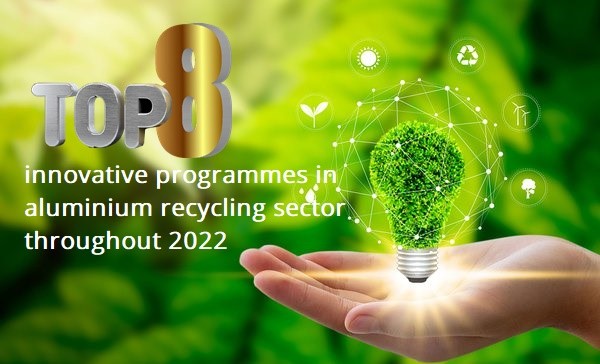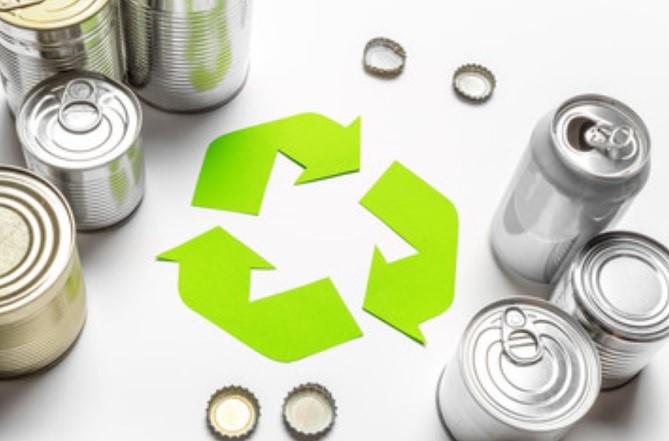您想继续阅读英文文章还
是切换到中文?
是切换到中文?

THINK ALUMINIUM THINK AL CIRCLE

Aluminium is one of the most sustainable metals found abundantly on the earth's surface, with an ability to retain its original properties even after undergoing rigid recycling processes. Therefore, companies that promote aluminium as their base raw material are always searching for sustainability drives across the entire value chain, which can renew their flagship objects without emitting the estimated amount of carbon or Green House Gases (GHGs) such products usually leave behind.

Products made of aluminium, if collected properly, can initiate a circular economy which can be very beneficial for the earth's atmosphere. Moreover, the Paris Environmental Pact of 2015 has instigated many global brands to follow green environmental practices that can curtail carbon emissions to a great extent. Some organisations have come up with incredible recycling practices that can help to propagate such sustainability programmes.
The list below charts the top eight innovative recycling practices introduced in 2022:
Podback Recycling Scheme
Though initially launched in April 2021, the Podback scheme gained immense recognition this year, with notable brands committing to its environmental-friendly protocol. Podback is a systematic programme through which aluminium coffee pods can be collected for further recycling processes to create a material rebuilding loop, resulting in a never-ending sustainable circular economy. This year various UK Councils like Conwy County and Chichester District embraced this fascinating drive that takes away half the trouble of recycling used plastic and aluminium coffee pods which was once a major cause of environmental concern in the terrain. Adding to that, supermarket brands like Morrisons and Aldi incorporated this scheme into their daily retail network, through which consumers would be able to send back the used coffee pods for safe recycling.
Ball and Boomerang
In September this year, USA's Ball Corp forged a partnership with Boomerang. The latter would provide a customised machine that would clean, sanitise, refill and seal bottles returned to it, inducing a closed-loop economy. The devices, called Boomerang Bottling System or BBS, can be installed inside malls, public arenas or sports grounds where people would be encouraged to use them for a better recycling practice. This revolutionary technology is something out of the future that makes recycling and reusing techniques simpler than they were before. Ball would supply bottles compatible with the BSS devices so that building a closed loop is much easier. Moreover, the BSS machine will reseal these Ball aluminium bottles before pushing them out of the system, giving the customers a brand-new feel.
Clean Tech Start-up Challenge
During November, the Hindalco-Manush Labs collaboration made headlines when they declared a 'Clean Technology Start-up Challenge' to acquire the set sustainability goals of individual establishments. Under this scheme, Manush Labs, the MIT spin-off, would promote further partnerships with tech start-ups that indulge in recycling activities. The main aim of this venture would be to propel the recycling of industrial wastes that contain material debris. This initiative is beneficial for the upcoming generation and will yield an environment-conscious lobby in the construction sector if done on a large scale.

Clutha Council Scheme
Clutha District Council, during the month of November, came up with a unique method to tackle waste management issues. This small New Zealand district began collecting tetra packs from the area, converting them through a process of decomposition into building materials for the construction sector. Usually, Tetra Packs are made of layers of cardboard, polyethene and aluminium and often, the sorting process is excessively costly and rare. Only a handful of organisations can afford the sorting technology, so Clutha Council has come up with a brilliant plan where the separation of these materials is not that important, and the entire package can be turned into a plasterboard-type material for easy use in construction projects.
Every Can Counts
In the month of July, a team of four members from Every Can Counts competed in Red Bull's renowned Soapbox Race. The primary aim behind this participation was to motivate individuals to dispose of their used beverage cans responsibly. Since aluminium can be infinitely recycled, this organisation focuses on safely transferring end-of-life aluminium cans into recycling units to extract a fresh batch of aluminium usable in making other essential items. Can manufacturers, the recycling industry and beverage brands fund this non-profit organisation.
Crewe Clean Team
In December this year, the Crewe community group consisting of 200 environment enthusiasts, received a national recycling award for collecting over 200,000 aluminium beverage cans in the last decade. The Crewe Clean Team, a 'committed' volunteer club, was acknowledged with a Green Can Award title from the non-profit organisation, Every Can Counts to uphold their positive contributions. The team carries on community litter-picking initiatives along the suburbs of Crewe and the surrounding local areas. They usually collect, separate and recycle aluminium.
Novelis and SPS
Novelis Inc., an American industrial aluminium company specialising in making flat-rolled products (FRPs) and recycling, announced in October that it initiated operations of closed-loop recycling with Smart Press Shop (SPS). In the alliance, Novelis supplies aluminium FRPs from its Nachterstedt plant in Germany to the Smart Press Shop and collects production scrap generated at SPS during the automotive manufacturing process to convert it into high-quality rolled sheets. This system will be beneficial for automobile geniuses around the world like VOLVO, Nissan, Ford, BMW and Jaguar Land Rover, as flat-rolled products are usually required for the creation of car bodies. Novelis will ultimately lower the potential carbon emissions starting from the production of the cars to them being scrapped at the end of their lives.
ThinkOrbital
Colorado-based space infrastructure provider, ThinkOrbital introduced the idea of a ThinkPlatform in the month of December when it hinted that this spacecraft could be used for recycling space waste and debris that usually loiter around in space, causing distractions. Since spaceships and other space objects have 100% recycled aluminium as one of their constitutional materials, this humungous project by space innovators can be very crucial for the upcoming years of humankind. This ThinkPlatform will act as a portal for the safe transformation of materials that are usually disregarded, while it should be understood that a vast treasure trove of innate elements is technically hovering outside the earth's surface because of humans.
It is really inspiring to see such great initiatives being taken to guard the environmental sanctity of the planet, but this does not mean, as individuals, we should turn a blind eye to the current climate crisis we are facing. Neither is it fine to be relaxed upon seeing such big initiatives already taking place on or outside the planet. International initiatives or programmes can only act as a guiding star for the upcoming generation, but it is upon us to be more conscious and active if we want to save the earth for future habitats. As human beings, each of us should be responsible for our homeland and follow protocols that make this a better place for livelihood.
Responses








